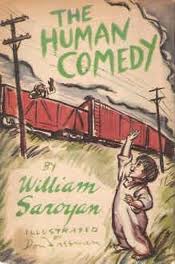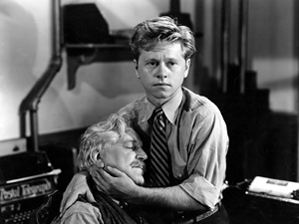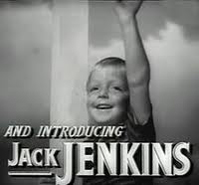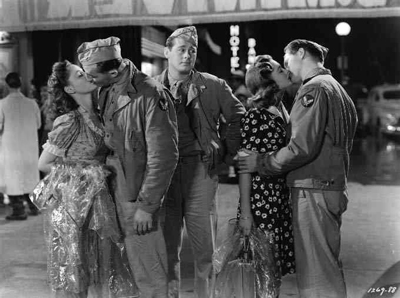
 |
|
|
|
An honest, heartfelt and humanist look at small town America in the midst of WW2, The Human Comedy was first a movie, and then adapted by its author William Saroyan into an extremely popular novel. As such it was considered important literature in the school systems of 1960, probably because it had no swearing, no sex and no troublesome political content, in contrast to that questionable scallywag John Steinbeck. I think I saw the film projected in a classroom twice during Junior and Senior High, you know, when they could have been teaching me something. 
The movie has all the faults of a wartime film tailored for morale purposes, and as such offers a strange mix of Saroyan's poetry (too much of it, in fact) and overbearing MGM sentiment. But even critic James Agee, who routinely condemned phony tearjerkers, found enough good qualities in The Human Comedy to recommend it with reservations. Despite its flaws the film is as touching now as it was then. I'm attracted to it for personal reasons. My mother grew up in a similar California town and became a mail carrier for the Post Office when all the men were drafted. Practically all the boys in her graduating high school class disappeared into the service. The Human Comedy comes closest to what I imagined my mother's home town experience to be -- her own young husband was away somewhere in North Africa. The Human Comedy is also an MGM film, produced and directed by Clarence Brown in the familiar studio style. It's a tough sell nowadays because, although most of its scenes are honest and quite a few have a wonderful, natural appeal, it oversells its message. The movie is by no means an embarrassing hoot, like the absurdly maudlin On Borrowed Time, but it does try too hard. Curiously, I don't remember the novel making the same mistakes. Narrating from beyond the grave, the phantom Mr. Macauley (radio great & Orson Welles actor Ray Collins) introduces his family, who are struggling to get by in the strict wartime economy. Pre-schooler Ulysses (Jack(ie) "Butch" Jenkins) is just learning about trains and eggs and strains to understand why his father isn't coming back, and why his older brother Homer (Mickey Rooney, understated and excellent) must work after school. Homer has obtained a job in the telegraph office, and grows up quickly when he must deliver death notices from the War Department. Homer is also frustrated that the girl he likes is attracted to a rich kid. Mrs. Macauley (Fay Bainter) guides her boys and plays the harp in the evening, while Homer's sister Bess (Donna Reed, gorgeous) plays piano. Young Mary (Dorothy Morris) drops in from next door; she's the girl friend of the oldest Macauley boy, Marcus (Van Johnson) who is away in the Army preparing to fight. All are naturally worried for him. 
Homer's boss at the telegraph office is Tom Spangler (James Craig), who while waiting to be called up falls in love with Diana Steed (Marsha Hunt), one of the richest girls in town. The old telegrapher is Willie Grogan (Frank Morgan) an alcoholic who needs close tending to function. The rest of the story breaks down into free-standing scenes of life in Ithaca. Homer is kept after school by a teacher, and cannot run in an important track meet. Accompanied by the older but scarcely brighter Lionel (Darryl Hickman), Ulysses visits a library, helps some kids raid an apricot orchard and watches a "mechanical man" perform in a drugstore window. Mary and Bess pick up three sweet soldiers (Barry Nelson, Don DeFore and Robert Mitchum) to attend a movie. Meanwhile, Marcus entertains his fellow soldiers with church songs and regales his new best friend Tobey (John Craven) with idyllic stories about his family. Tobey is an orphan. He 'adopts' Marcus'es family as his own, hoping to return to Ithaca someday as if it were his own hometown. The Human Comedy is warm and intelligent and faces up to wartime realities in a way not all that common in morale pix made during hostilities. If it's propaganda, it's propaganda for an idealized America and not simply a "Ma & Apple Pie" illusion (although both institutions appear). The people appear real and unaffected, with Homer's sister and the neighbor girl wearing simple print dresses, not Hollywood fashions. And Butch Jenkins, a tiny tow-head who seems to be all freckles and hair, is an authentically ordinary young spud of a kid, not some brat from a child star academy. Saroyan starts the movie with a terrific scene of Ulysses waving at a passing freight train, and getting a response from a black man who shouts that he's "going home". The author seems totally in sync with John Steinbeck's vibe -- James Dean could be riding on the same train. Louis B. Mayer must have been impressed by Butch Jenkins, for his scenes are duplicated almost event-for-event to showcase child star Margaret O'Brien in the next year's Meet Me In St. Louis. 
Although some parts of the film couldn't be improved, the adaptation tries too hard to retain Saroyan's verbal poetry. We hear several characters "thinking aloud" during the film, which would be an okay device if they weren't all speaking the author's sentiments, in the exact same style. And the script doesn't stop there -- the show comes to a halt in at least every other scene so that Mrs. Macauley or old Willie Grogan or Homer's wise teacher (Mary Nash) or Marcus can deliver a gilt-edged "author's message". Most of these speeches are sincere, but they just aren't natural -- they're more appropriate to a stage presentation, except that any wise stage director would also trim them down. And again, it's all in poetic Saroyan-speak, so that Mr. Macauley (the ghost), his wife, and Marcus all seem to be puppets of the same personality. I frankly think the movie would work much better if all of the scenes with Marcus and Tobey away in the Army were dropped. They're outside the experience of the town, and embarrassingly phony. This must be the picture that assured Mr. and Mrs. America that their sons in the Army were sitting around a campfire somewhere, singing church songs and opening packages of cookies from home. Here it seems that Marcus, without even asking his sister, is setting her up as Tobey's future mate. It would be much more dramatically interesting -- and plenty spooky -- if a strange soldier just showed up on the Macauley doorstep, hoping against hope that he'll be accepted. The feature version of The Human Comedy also bends too far backward to assure ordinary working-class Americans that Rich People are just like You and Me, honest! You'd think that Louis B. Mayer was afraid of a class revolution. Tom Spangler's wealthy fianceé uses practically those exact words. Why, they live in those big houses but their boys are going off to war just like yours are. Diana Steed snubs Tom's co-workers in the telegraph office, and then takes him on a hilariously insulting tour of a local festival attended by various ethnic groups -- Poles, Mexicans, Greeks, Russians and Armenians (they believe in Priests and kids, did you know?) Tom and Diane drive through looking at all the music and dancing packed into one small area (an acoustic impracticality) and don't even get out of the car. The scene is very much like a theme ride, and resembles It's a Small World at Disneyland. Frankly, while the stylish Diane points and smiles at all the happy faces at this picnic, we can almost hear her cooing, "Look! There's my gardener and there's my barber and there's my manicurist and there's my grocer ..." 
The film's most serious misstep is bookending the story with the spectral presence of the dead Mr. Macauley. Special effects allow him to enter a scene or two, to kiss his widow's head -- as in more blatant films blanc, his wife feels something but doesn't know he's there. Several characters talk about religion, faith and the meaning of prayer and belief. But the ghostly storytelling device undercuts their real, honest sentiments by bringing in an outright fantasy element, removing the need for faith in the afterlife. We can see the proof for ourselves: benign ghosts are real and we're all going to our appropriate rewards. Mystery solved. The Human Comedy didn't need this dimension at all. It cheapens the movie, sacrificing its reality-based emotional grip for some flashy magic tricks. But that's not a good enough reason to avoid The Human Comedy, because its core remains honest despite these Hollywood add-ons. Mickey Rooney can be intolerable when he's selling joy and glee and his big bundle of talent and ego -- here he understands the story and communicates its spirit beautifully. Sure, he's a smartass in his history class, but we aren't really on his side. And when he imagines his reaction should his brother die in the war, Homer delivers a speech worthy of a film noir loser: "I'll spit at the world." A key scene in the film that Rooney gets just right, is when Homer has to deliver a "We regret to inform you..." note to a Mexican-American mother. Homer stammers a bit, but then he shuts up and gives the scene over to the other actor. It's about the woman's suffering first and Homer's emotions second. And Rooney plays it flawlessly. 
The Warner Archive Collection DVD-R of The Human Comedy looks extremely good in its new Remastered Edition form; no more unsteady frames or unstable contrast. The resulting restoration is of a high quality and should please fans and collectors. Although there are studio scenes and some rear-projection is used, much of The Human Comedy was shot in a Calabasas ranch area, resulting in a more realistic, down-to-earth look than we're accustomed to seeing from MGM. Now if they'd just made the whole show less fanciful and glossy... I'm not a particular fan of composer Herbert Stothart, but the film's score has a wistful quality reminiscent of quieter scenes in The Wizard of Oz ... perhaps this is due to MGM's corps of talented music arrangers. A trailer is included that is most likely a resissue piece, as it pays as much attention to the success of the book version than the film itself. The Human Comedy will prove rewarding to viewers able to understand its wartime background and the preferences of Louis B. Mayer and MGM -- it is said to have been his favorite studio production.
On a scale of Excellent, Good, Fair, and Poor,
The Human Comedy rates:
Reviews on the Savant main site have additional credits information and are often updated and annotated with reader input and graphics. Also, don't forget the 2010 Savant Wish List. T'was Ever Thus.
Review Staff | About DVD Talk | Newsletter Subscribe | Join DVD Talk Forum |
| ||||||||||||||||||